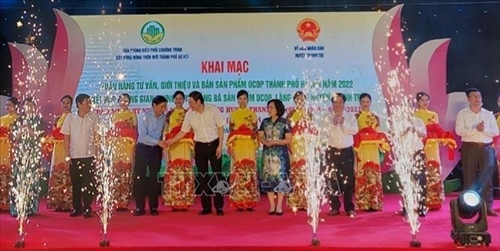The event is organized by the municipal coordinating office for the new-style rural area building program of Hanoi.
Addressing the opening ceremony on September 27, Nguyen Ngoc Son, Vice Director of the municipal Department of Agriculture and Rural Development, said the OCOP fair aims to help with the promotion, trade and sales of local products; and to develop the rural economy based on increasing application of digital transformation technology, boosting the growth of a circular economy, and enhancing rural people’s income and living standards.
    |
 |
|
At the opening ceremony on September 27 |
OCOP goods are highly localized products, often food, that come from one small specific area.
So far, Hanoi has recognized 1,649 OCOP goods, including four products rated five stars, 1,098 others rated four stars, and 534 rated three stars. They include 1,071 food, 35 beverage, 17 herbal, 492 handicraft, and 34 fabric and apparel products. The capital city is taking the lead nationwide in terms of the numbers of OCOP products and five-star OCOP products.
According to Nguyen Van Chi, deputy chief of the coordinating office, the city houses 1,350 craft villages, accounting for the largest number of such villages in the country. These places are home to 47 out of 52 traditional crafts of Vietnam. Among them, there are 313 accredited by Hanoi People's Committee as craft villages and traditional craft villages.
The capital city, meanwhile, has over 9,900 agricultural and food products with QR code serving their traceability.
Apart from product assessment and rating, the city has also paid attention to organizing events, fairs and workshops to increase connectivity under value chains and advertise those products to other localities in Vietnam and international partners. Many showrooms of OCOP products have also been opened in tandem with the development of craft village tourism and rural tourism.
In 2022, the city plans to hold four events in different local districts to introduce OCOP products of not only the city but also other provinces in the northern, central, Central Highlands, and southern regions.
The authorities said they will assist with the opening of OCOP showrooms so that these products can access more consumers city-wide. Distributors, shopping centers, supermarkets, grocery and handicraft stores and e-commerce platforms will be encouraged to tighten links with producers to boost sales of OCOP items.
By 2025, Hanoi looks to have an additional 2,000 OCOP products rated at least three stars, all communes that meet advanced criteria of the new-style rural area building program having OCOP products, and at least 70% of OCOP product makers being cooperatives, cooperative groups and businesses.
Meanwhile, the municipal People’s Committee also made a plan on developing agricultural and rural tourism in tandem with new-style rural area building during 2022-2025, part of efforts to boost sustainable tourism development.
In this plan, each suburban district holding potential and advantages for agricultural and rural tourism will develop from one to three community-based tourism services or sites, with at least 50% of those products registered for intellectual property protection and recognized as three-star or higher products under the OCOP program.
The program was initiated by the Ministry of Agriculture and Rural Development in 2008, based on Japan’s “One Village, One Product” and Thailand’s “One Tambon, One Product” programs. It is an economic development program for rural areas and also to help implement the national target program on new-style rural area building.
OCOP products are made based on the combination of local resources, traditional culture, and advanced technology, thus promoting product diversification, quality, packaging, and origin traceability.
The program has provided farmers with the chance to come together to form cooperatives, which in turn have enabled farmers to create goods with better quality, design, and packaging that meet higher standards and match market demand.
Source: VNA